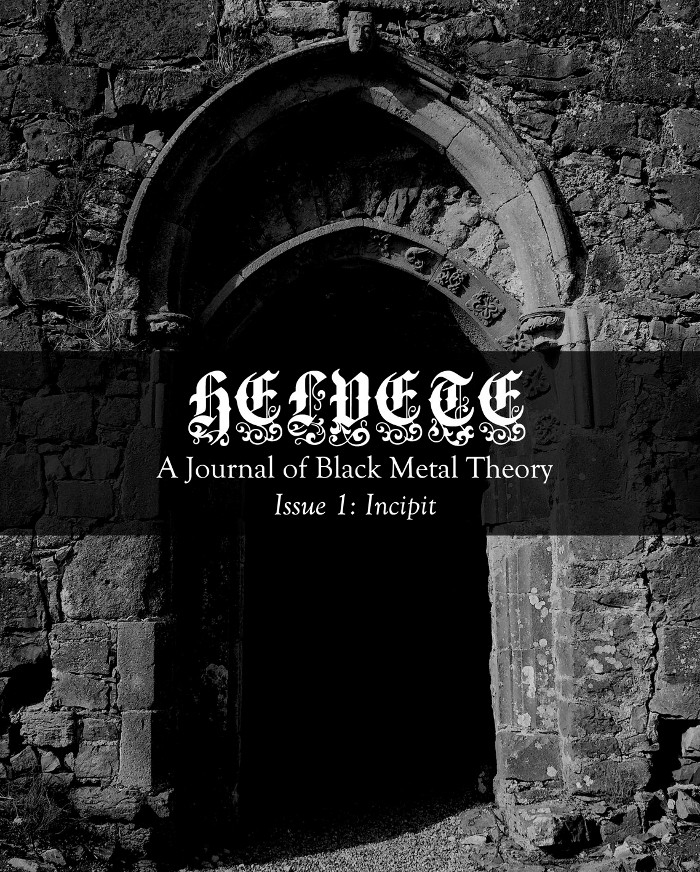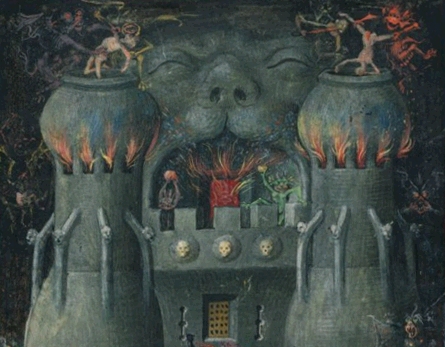Helvete: A Journal of Black Metal Theory, No. 1: Incipit (2013)
Filed under journal | Tags: · black metal, music

Helvete is an open access electronic and print journal dedicated to continuing the mutual blackening of metal and theory inaugurated by the Black Metal Theory Symposia. Not to be confused with metal studies, music criticism, ethnography, or sociology, Black Metal Theory is a speculative and creative endeavor, one which seeks ways of thinking that count as Black Metal events — and indeed, to see how Black Metal might count as thinking. Theory of Black Metal, and Black Metal of theory. Mutual blackening. Therefore, we eschew any approach that treats theory and Metal discretely, preferring to take the left-hand path by insisting on “some kind of connaturality between the two, a shared capacity for nigredo.”
Issue 1: Incipit includes: Zareen Price, “Dilation: Editor’s Preface” — Janet Silk, “Open a Vein: Suicidal Black Metal and Enlightenment” — Timothy Morton, “At the Edge of the Smoking Pool of Death: Wolves in the Throne Room” — Elodie Lesourd, “Baptism or Death: Black Metal in Contemporary Art, Birth of a New Aesthetic Category” — Amelia Ishmael, “The Night is No Longer Dead; it has a life of its own” [featuring artwork by: Alexander Binder, Gast Bouschet and Nadine Hilbert, Ibrahim R. Ineke, Alessandro Keegan, Irena Knezevic, Allen Linder, Gean Moreno, and Nine Yamamoto-Masson] — David Prescott-Steed, “Frostbite on My Feet: Representations of Walking in Black Metal Visual Culture” — Daniel Lukes, “Black Metal Machine: Theorizing Industrial Black Metal” — Joel Cotterell, “This is Armageddon: The Dawn Motif and Black Metal’s Anti-Christian Project”
Issue 1, Winter 2013
Edited by Amelia Ishmael, Zareen Price, Aspasia Stephanou, Ben Woodard
Publisher Punctum Books, Brooklyn, NY, 9 April 2013
Creative Commons Licence BY-NC-ND 3.0
ISSN 2326‐683X
ISBN 0615758282, 9780615758282
134 pages
PDF (single PDF)
PDF (PDF articles)
Glossator: Practice and Theory of the Commentary, Vol 6: Black Metal (2012)
Filed under journal | Tags: · black metal, music, music criticism, philosophy

Glossator publishes original commentaries, editions and translations of commentaries, and essays and articles relating to the theory and history of commentary, glossing, and marginalia (catena, commentum, gemara, glossa, hypomnema, midrash, peser, pingdian, scholia, tafsir, talkhis, tika, vritti, zend, zhangju, et al). The journal aims to encourage the practice of commentary as a creative form of intellectual work and to provide a forum for dialogue and reflection on the past, present, and future of this ancient genre of writing. By aligning itself, not with any particular discipline, but with a particular mode of production, Glossator gives expression to the fact that praxis founds theory.
With contributions by Steven Shakespeare, Aspasia Stephanou, Ben Woodard, Eugene Thacker.
Editors: Nicola Masciandaro & Reza Negarestani
Editor-in-Chief: Nicola Masciandaro
Published in June 2012
Creative Commons Attribution 3.0 United States License
ISBN 1477667466, 9781477667460
130 pages
Eugene Thacker: In the Dust of This Planet (2011)
Filed under book | Tags: · black metal, demonology, horror, magic, mysticism, occultism, occultural studies, philosophy, supernatural, theology, witchcraft

The world is increasingly unthinkable, a world of planetary disasters, emerging pandemics, and the looming threat of extinction. In this book Eugene Thacker suggests that we look to the genre of horror as offering a way of thinking about the unthinkable world. To confront this idea is to confront the limit of our ability to understand the world in which we live – a central motif of the horror genre.
In the Dust of This Planet explores these relationships between philosophy and horror. In Thacker’s hands, philosophy is not academic logic-chopping; instead, it is the thought of the limit of all thought, especially as it dovetails into occultism, demonology, and mysticism. Likewise, Thacker takes horror to mean something beyond the focus on gore and scare tactics, but as the under-appreciated genre of supernatural horror in fiction, film, comics, and music. This relationship between philosophy and horror does not mean the philosophy of horror, if anything, it means the reverse, the horror of philosophy: those moments when philosophical thinking enigmatically confronts the horizon of its own existence. For Thacker, the genre of supernatural horror is the key site in which this paradoxical thought of the unthinkable takes place.
Publisher Zero Books, Winchester, UK / Washington, USA, 2011
Horror of Philosophy vol. 1
ISBN 184694676X, 9781846946769
179 pages
author (Occultural studies blog at Metamute.org)
PDF (EPUB; updated on 2012-7-25)
Comment (0)
